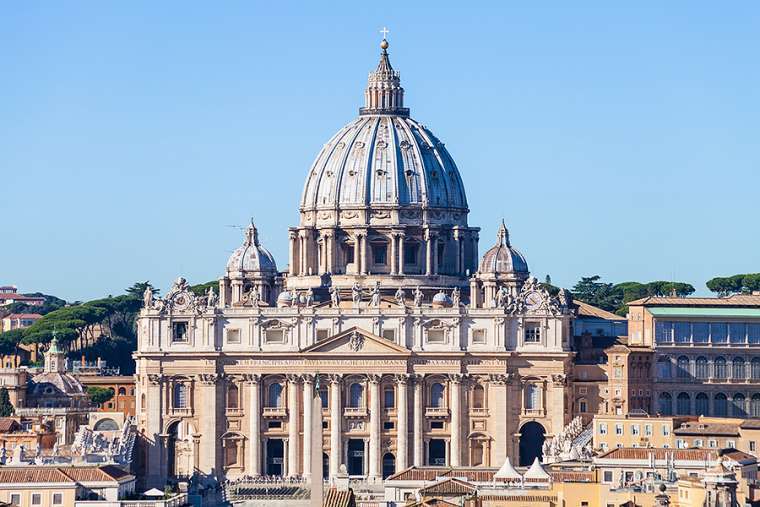ROME – Pope Francis’s trip to Ireland for the World Meeting of Families will likely be his first international trip not to include the “sostituto,” or deputy, of the Vatican Secretariat of State among the papal entourage.
Since the former “sostituto,” Giovanni Angelo Becciu, was created a cardinal and promoted to lead the Congregation for the Causes of Saints in May, the position has been vacant.
The pope was expected to fill the position once Becciu’s mandate formally ended at the end of June, but he did not.
Now that the trip to Ireland is approaching, reports are spreading that Francis might appoint Becciu’s successor by the end of the week.
The position of the “sostituto” is important for the functioning of the Secretariat of State and the entire Roman Cura.
According to Pastor Bonus, the apostolic constitution that defines the tasks and competencies of Curial offices, the “sostituto” is at the helm of the first section of the Secretariat of State, the section on “general affairs.”
In practice, the “sostituto” works as a coordinator, and as a link between the pope and the secretary of state, becoming in many cases the person closest to the pope.
This is likely the reason Francis wants to ponder carefully who will be the next “sostituto.”
On the other hand, the competencies of the “sostituto” might change some when Praedicate Evangelium, the anticipated apostolic constitution updating the governance structures of the Vatican, is published and takes effect, and the pope might be waiting for the promulgation of that document before appointing a person to the role.
The Secretariat of State has already changed its shape under Francis; the pope established in November a third section dedicated to the pastoral care of nuncios and other diplomatic personnel.
The newly established department took on the competencies of the Office for Pontifical Representatives, which was previously under the first section of the Secretariat. As the same time, the third section also absorbed some of the tasks generally entrusted to the first section, among them the presentation to the pope of three candidates for a nuncio position, and granting special permissions or delegations to nuncios.
The new “sostituto” will be called to work out a transition toward a new modus operandi of the Secretariat of State.
There has been a great deal of speculation about who will be picked for the job.
The “sostituto” is entrusted with general affairs, so it is not a diplomatic role, as is the Secretary for the Relations with States, who heads the Second Section. However, lately the “sostituto” have been picked from among the ranks of papal nuncios, as all of them have had experience in diplomatic work.
Since the position of the sostituto was created in 1831, there have been 20 deputies to the Secretary of State, and 17 of them were Italians. The tradition of an Italian “sostituto” was broken under John Paul II, who picked the Spanish Eduardo Martinez Somalo (1979 – 1988), the Australian Edward Idris Cassidy (1988 – 1989) and the Argentinian Leonardo Sandri (2000 – 2007).
Since 1953, the “sostituto” has always had a past in the diplomatic service.
Will Francis keep that tradition?
Vatican observers claim that the pope will likely choose an active nuncio for the position. Some have speculated that the pope might pick Archbishop Nicola Girasoli, nuncio to Peru, or Archbishop Giordano Caccia, nuncio to Philippines. Other reports say that the top candidate for the position might be Archbishop Bernardito Auza, Holy See Observer to the United Nations in New York.
It is also rumored that the pope might appoint Bishop Marcello Semeraro of Albano as “sostituto” – he is a longtime friend of the pope. He is serving as secretary of the Council of Cardinals, and so he would be well positioned to oversee Curia reform – including that of the Secretariat of State.
However, there is no consensus candidate within the Vatican corridors. Names circulate in conversations with Vatican officials, but they are considered to be, at best, possibilities.
Among the possibilities, there is a new entry who could represent a concrete option for the future: Archbishop Edgar Peña Parra, apostolic nuncio to Mozambique.
Peña Parra fits many of Francis’s priorities.
First, he is not Italian, and Francis seems keen to dispense with an overreliance on Italians.
Second, he comes from Venezuela: with his appointment, Francis might further show his attention to the situation in that country, where every Church mediation in the messy political situation has thus far failed.
Third, he was apostolic nuncio to Pakistan from 2011 to 2015, a country to which Francis has paid particular attention, even appointing a cardinal from Pakistan in the last consistory.
Peña Parra therefore has a deep knowledge of two of the issues that Francis deems important. In addition, his doctoral dissertation has become a reference point for the study of human rights, an issue of importance to the pontiff.
At the moment, and for all of these reasons, the appointment of Peña Parra is considered a strong possibility. However, Vatican sources have maintained that “the pope will make his decision alone,” and that “the pope can always surprise us.”
Much will be understood from the timing of the appointment: While it seems likely that the pope will announce the appointment of the new “sostituto” by the end of the week, the decision can always be postponed to September, when vacation time is over and when the reform of the Curia should be in full swing.











